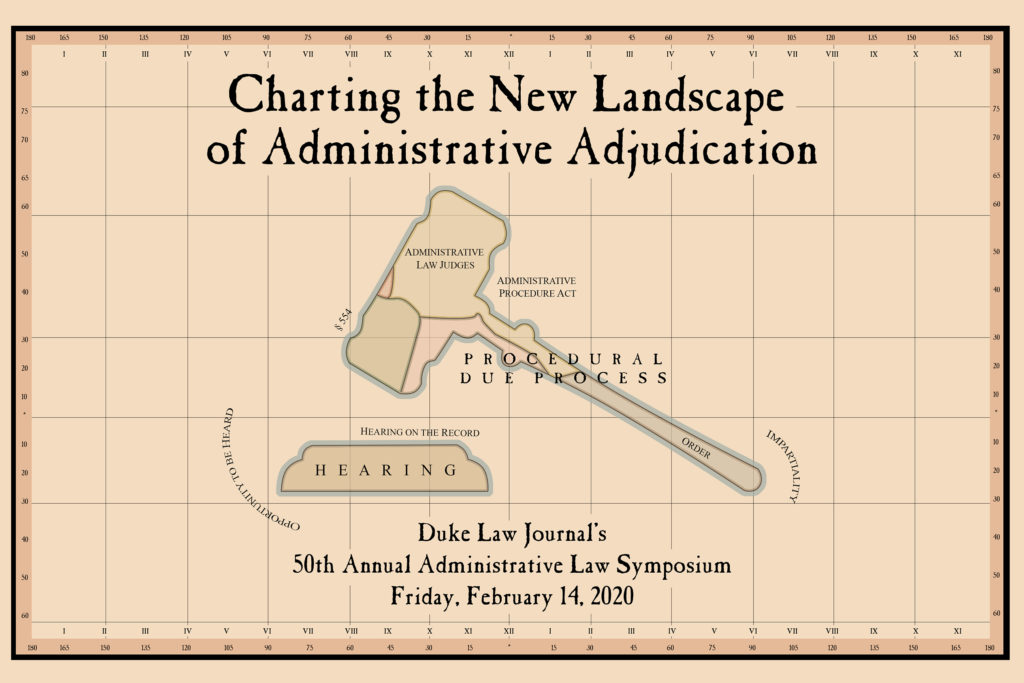50th Annual Duke Law Journal Administrative Law Symposium: Charting the New Landscape of Administrative Adjudication, 2/14

Kent Barnett, Emily Bremer, and I are thrilled to have organized the Duke Law Journal‘s fiftieth annual administrative law symposium, entitled Charting the New Landscape of Administrative Adjudication. The live symposium takes place this Friday, February 14, 2020 (Valentine’s Day!), so if you’re in the area definitely come join us. I’ll post links to the video of the symposium once it becomes available. More information on the symposium is here.
Overview of Symposium
Originally the primary mode of agency policymaking, adjudication has for decades taken a backseat to rulemaking. In the 1960s and 1970s, courts, scholars, and policymakers turned their attention to rulemaking, viewing it as a more democratic and legitimate mode of administration. On a system-wide basis, rulemaking also became easier to study than adjudication. The Administrative Procedure Act defines the rulemaking process—whether in its so-called “formal” or “informal” manifestations—in detail. In contrast, the APA provides procedures only for formal adjudication, and not for its informal counterpart. As courts became reluctant to enforce these “formal” adjudication provisions, they gave agencies broad discretion to design unique, “informal” adjudicatory procedures for individual regulatory programs. Compared to rulemaking’s generalizable uniformity, administrative adjudication became a diverse mélange that was difficult to discuss and to study. All the while, some of the largest and most important government programs—Social Security, immigration, veterans’ benefits, and patents—continue to be administered through adjudication. The new world of administrative adjudication—with its diversity, mutations from formal adjudication, ad hoc development, but ever abiding significance to policymaking—is ripe for sustained scholarly and policymaking inquiry.
Indeed, administrative adjudication has begun to receive renewed attention—and scrutiny. The Supreme Court has recently considered constitutional questions regarding the appointment of administrative law judges (ALJs) (Lucia v. SEC) and the limits of administrative adjudication under Article III (Oil States Energy Services, LLC v. Greene’s Energy Group, LLC). In response to Lucia, the President issued an Executive Order that has radically altered the process for selecting and appointing ALJs, and the Department of Justice has argued that the Supreme Court should make it easier for agencies to remove ALJs. Meanwhile, scholars have raised questions about the role and status of both ALJs and non-ALJ adjudicators. Several large-scale studies of administrative judges and adjudication procedures have been launched. These studies are producing new information to inform an increasingly robust debate about the state of administrative adjudication. This debate has high stakes for matters of national concern, most notably in the areas of patent law and immigration.
This one-day symposium will offer what has in recent years been sorely lacking in scholarly and policymaking circles—a comprehensive introduction to the emerging reconsideration of administrative adjudication. An introductory keynote will frame the day’s discussion by explaining the history and importance of the Duke Law Journal’s Administrative Law Symposium and administrative adjudication. The day will include three panels, addressing the following topics: (1) The New Landscape of Agency Adjudication; (2) Designing Rules and Adjudicators for the New World; and (3) The New World in Context: Immigration Adjudication. A unique, additional perspective will be provided by a lunchtime talk among adjudicators at various agencies.
Symposium Agenda and Speakers
8:30 AM: Breakfast and Registration
9:00 AM: Welcome – Farrah Bara & Dean Kerry Abrams
9:05 AM: Introductory Keynote – Randy May
Session 1: The New Landscape of Administrative Adjudication
9:30 – 10:45 AM
Presenters
- Kati Kovacs
- John Duffy
- Emily Bremer
- Matt Wiener
- (Moderator) Chris Walker
Session 2: Designing Rules & Adjudicators for the New Landscape
11:00 AM – 12:15 PM
Presenters
- Michael Sant’ambrogio
- Adam Zimmerman
- Michael Frakes
- Melissa Wasserman
- Arti Rai
- (Moderator) Kent Barnett
Lunch Panel: The Agency Adjudicators’ View on the New Landscape
12:30 PM – 1:30 PM
Presenters
- Nancy Griswold, Chief Administrative Law Judge of the Office of Medicare Hearings and Appeals
- Scott Boalick, Chief Administrative Patent Judge of the Patent Trial and Appeal Board
- James McHenry, Director of the Executive Office for Immigration Review
- (Moderator) Chris Walker
Session 3: The New Landscape in Context—Immigration Adjudication
1:45 PM – 3:00 PM
Presenters
- Catherine Kim
- Amy Semet
- Michael Kagan
- Jennifer Koh
- (Moderator) Dean Kerry Abrams



